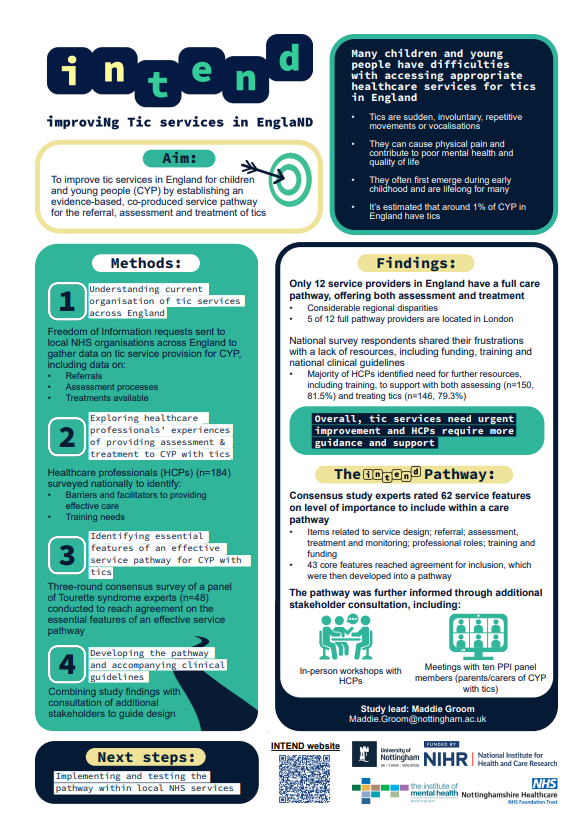Category menu

INTEND - ImproviNg Tic services in EnglaND
Posted on 14 July 2025 by Pippa McClounan
A summary of a recent research study supported by TA

Children and young people in England often struggle to access suitable healthcare services for tics and Tourette syndrome, sometimes having to wait years to receive a diagnosis. Being able to access NHS services for tics without a long wait is crucial for helping young people to manage their tics and maintain, healthy, positive, school and social lives and reducing negative long-term effects. The INTEND study (ImproviNg Tic servicEs in EnglaND) was funded by the National Institute for Health and Care Research under the Research for Patient Benefit Programme and aimed to develop a care pathway for children and young people with tics. The study had four main areas of work:
1) Sending requests for information to local NHS organisations across England to gather data on tic service provision, including data on referrals, assessment and treatment
2) Conducting a national survey of healthcare professionals to explore their experiences of providing assessment and treatment for young people with tics
3) Surveying a panel of experts in the field of tics and Tourette syndrome to reach agreement on essential features of an effective care pathway
4) Combining these study findings with input from healthcare professionals and members of the lived experience community to develop the pathway and its accompanying clinical guidelines
Responses from NHS organisations demonstrated that tic services provision was inconsistent and very limited across England. Only 12 service providers were identified as providing a full care pathway that offered both assessment and treatment, and 5 of these providers were located in London.
The national survey was completed by 184 healthcare professionals. They highlighted a lack of resources, including funding, training and national clinical guidelines around tics. A majority of survey respondents identified a need for further resources to support them with both assessing and treating tics, including training. FOI and national survey responses together emphasised that tic services need urgent improvement and healthcare staff require more guidance and support.
Experts rated 62 service features on level of importance to include within a care pathway. Based on these ratings and a team workshop, a final 43 service features were approved to guide the design of the care pathway.
Our Patient and Public Involvement (PPI) panel consisting of ten parents/carers of young people with tics provided vital input throughout the study. They shared feedback on study findings, including how findings reflected their personal lived experience. Their input on key aspects of the INTEND Pathway also ensured that its design suited the needs of young people with tics and their families.
We are now completing further work to organise a future evaluation study to test the INTEND Pathway on a local level to ensure effective tic service delivery across England.
Click here to read the paper published in the British Medical Journal (BMJ)


